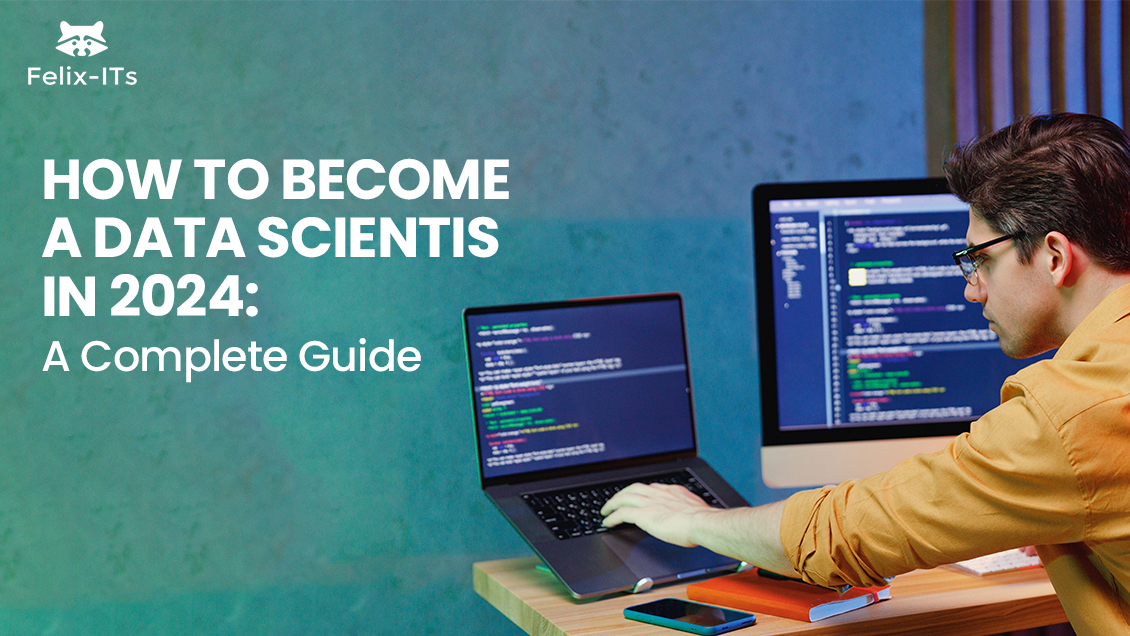A data scientist is an expert who collects, analyzes, and interprets large amounts of data. This role combines aspects of traditional technical roles like scientist, mathematician, and computer professional. Data scientists are in high demand due to their work on diverse projects, such as developing self-driving cars or annotating photos automatically. They use their industry knowledge, and contextual understanding to find solutions to business problems.
It is a promising career and individuals aspiring to become a data scientist should follow a step-by-step guide. Felix-ITs offers a comprehensive data scientist course to help students move ahead in this career.
In this article, we will discuss a complete guide on how to become a data scientist!
A Step-By-Step Guide to Becoming an Aspiring Data Scientist
A lot of students and even professionals ponder upon how to become a data scientist. The idea may sound overwhelming but with the right guidance, it becomes possible for everyone to become a data scientist, especially through a data scientist course.
Here’s a detailed step-by-step guide by Felix-ITs!
Start With a Data Scientist Course
Going for a Data Scientist course is a crucial initial move for aspiring data scientists. This specialized training not only provides an insightful introduction to data science but also serves as a structured pathway for acquiring essential skills. You gain hands-on experience with key tools and techniques.
The data science classes in Ahmedabad usually include programming languages, statistics, and machine learning. Helping students handle practical data problems. So, enrolling on a data scientist course is a great way to kickstart your career in this field.
Learn Data Science Fundamentals
Another crucial step in how to become a data scientist is learning the fundamentals. You can start by understanding core concepts like statistics, programming, and data manipulation. Learn tools like Python and R. Grasp statistical methods for data analysis. Familiarize yourself with databases and data visualization.
Build a strong foundation before diving into advanced topics. This ensures a solid understanding of data science principles, paving the way for success in this dynamic field. Even after attending the data science classes in Ahmedabad, familiarizing yourself with the fundamentals is beneficial.
Pursue Formal Education
A data scientist degree is not always needed but pursuing one can help you stand out in the job market. However, there are still education requirements one must meet. Although it’s not always necessary, employers typically prefer to see proof of your academic accomplishments.
To make sure you have the skills to handle a data science position. You can consider pursuing a relevant bachelor’s degree in data science, statistics, or computer science. If you have decided not to enrol on a data scientist course, then pursuing a bachelor’s degree becomes significant.
Develop Essential Skills
Consider joining an appropriate data science course or a suitable boot camp if you feel you could improve your hard data skills. The following are some of the abilities you should possess.
Programming languages are being used by data scientists to sort through, examine, and handle huge amounts of data. The following are common programming languages for data science:
- Python
- R programming
- SQL
- SAS
Data visualization: An important component of becoming a data scientist is having the ability to design graphs and charts. You should be ready to complete the assignment if you are familiar with the following tools:
- Tableau
- PowerBI
- Excel
Machine learning: When you use machine learning and deep learning in your work as a data scientist, you might potentially forecast the results of future datasets and continuously improve the quality of the data you collect.
Big Data: Some employers might want to know that you’ve dealt with big data before. Hadoop and Apache Spark are two examples of software frameworks used to process large data.
Essential Data Science Tools
Familiarize yourself with data visualization tools like Tableau or Matplotlib to present insights. Also, explore SQL for database querying and management. Learn to leverage Jupyter Notebooks for interactive coding. Embrace libraries like Pandas and NumPy for efficient data handling.
Master machine learning frameworks such as Scikit-Learn for predictive modelling. Learn these tools to tackle data challenges and turn raw information into useful insights.
Gain Practical Experience & Create a Portfolio
Building a robust portfolio is crucial to highlight your skills and enthusiasm. Especially if you don’t have a formal education or work experience. Focus on diverse data science projects that pique your interest, emphasizing creativity and individuality. This hands-on approach not only enhances practical knowledge but also creates a tangible showcase of your abilities.
Thus, making you stand out to potential employers or collaborators. Build experience and create a strong portfolio to unlock opportunities in the dynamic field of data science.
Start with an Entry-level Analytics Job
An excellent place to start is by working in a relevant entry-level position. Consider careers as a data analyst, business intelligence analyst, statistician, or data engineer, or in a similar job. From there, as your knowledge and abilities grow, you could eventually work your way up to becoming a scientist.
Practice Yourself for Data Science interviews
You could feel prepared to transition into data science after a few years of working with data analytics. Prepare responses to likely interview questions once you’ve landed an interview.
Data scientist positions can be very technical. Prepare for both technical and behavioural questions.
You can give the interviewer the impression that you are confident and informed by coming prepared with examples from your prior professional or academic experiences.
Data scientists are in high demand because they can help businesses save money or improve consumer satisfaction. To learn, you must follow the same procedure: keep looking for new subjects to research and keep responding to questions that are harder and more challenging.
Data Scientist Salary in India
According to AmbitionBox Data Scientist salary in India with less than 1 year of experience to 8 years ranges from ₹ 3.9 Lakhs to ₹ 27.9 Lakhs with an average annual salary of ₹ 14.3 Lakhs. Moreover, a Data Scientist’s salary in Ahmedabad ranges between ₹ 3.0 Lakhs to ₹ 15.0 Lakhs with an average annual salary of ₹ 12.1 Lakhs.
Big data’s rise in importance for corporations and organizations is linked to a growing demand.
Final Thoughts
An in-demand career such as a data scientist requires a whole lot of effort, skills and training. With so much competition in the market, it is not easy to stand out. It takes a lot of work to study to become a data scientist, but the key is to stay motivated and enjoy the process.
However, the best way to begin this career is by going for data science classes in Ahmedabad by Felix-ITs.
The data scientist course covers each important topic in detail through the expert faculties. Along with that, the best thing about the data scientist course at Felix-ITs is the placement support once you complete the course.
So, students can be relieved about the prosperous career opportunities while attending data science classes in Ahmedabad!


